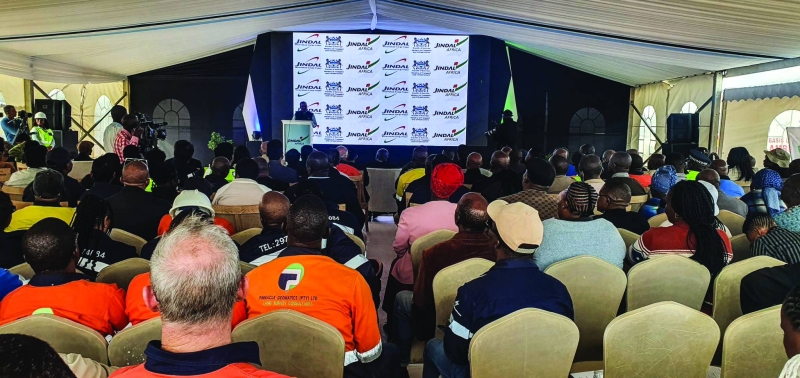Jindal outlines community support plan in Mmamabula area
Otlarongwa Kgweetsi | Tuesday May 20, 2025 14:03


The corporate social impact initiatives are part of the company’s ongoing activities in the region and were announced at the ground breaking ceremony for a road project being constructed by the energy group. The 26-kilometre tarred Capricorn Road project is being funded by Jindal to the tune of P300 million. The support programmes that were revealed by officials of the company include donations to local clinics and schools, provision of medical outreach services and plans to assist under-resourced learners with uniforms and hygiene items. Speaking at the event, Jindal Africa CEO Parshant Goyal said, “We have donated medical equipment and accessories to four clinics in the region.” He added that the company is also coordinating with healthcare professionals to establish mobile clinics that will focus on women’s and children’s health.
“We are working with specialists to introduce medical camps where paediatricians and gynaecologists would attend to local communities,” Goyal said. The outreach is aimed at bringing clinical services to residents who live in areas where specialist access is limited or unavailable. Jindal Africa’s health support comes at a time when many rural clinics in Botswana face resource constraints, especially in maternal and child health. The planned medical camps will allow rotating access to doctors who can assist with screenings, early interventions, and referrals. In addition to healthcare, the company has begun providing support to local schools. When speaking at the ceremony, Goyal revealed the company has already donated textbooks, sanitary pads and toiletries to Kudumatse Primary School. “We intend to donate school uniforms to over 2,000 learners in the area. These efforts reflect our belief that access to quality education nurtures young minds to contribute to sustainable development,” he said.
The uniforms, along with classroom materials and hygiene packs, are intended to relieve the financial burden on families and improve the dignity and confidence of school-going children. The donations will be distributed in collaboration with local school officials and village authorities. Jindal Africa’s Country Director, Neeraj Saxeena, said the company’s approach is based on listening to the communities where it operates. “We recognise that infrastructure is only one part of development. People need health, education, and everyday dignity that’s what these programmes are about,” he told the gathering. Saxeena added the company is consulting with local tribal leadership, council representatives and clinics to determine future areas of support. While specific figures were not disclosed at the event, he stated that resources have already been allocated for the next phase of outreach. “We’re already in discussions with partners to expand into areas such as youth training and women’s empowerment. “We want to do this responsibly and with proper input from community structures,” Saxeena said.
For his part, Assistant Minister of Transport and Infrastructure, Keoagile Atamelang welcomed the community support efforts, saying, “These kinds of partnerships are important. They build trust and create development that people can see and feel.” The education support programme will be rolled out across multiple primary schools in Mahalapye sub-district. In addition to learning materials and uniforms, Jindal Africa has indicated interest in supporting health education and school cleanliness initiatives.
